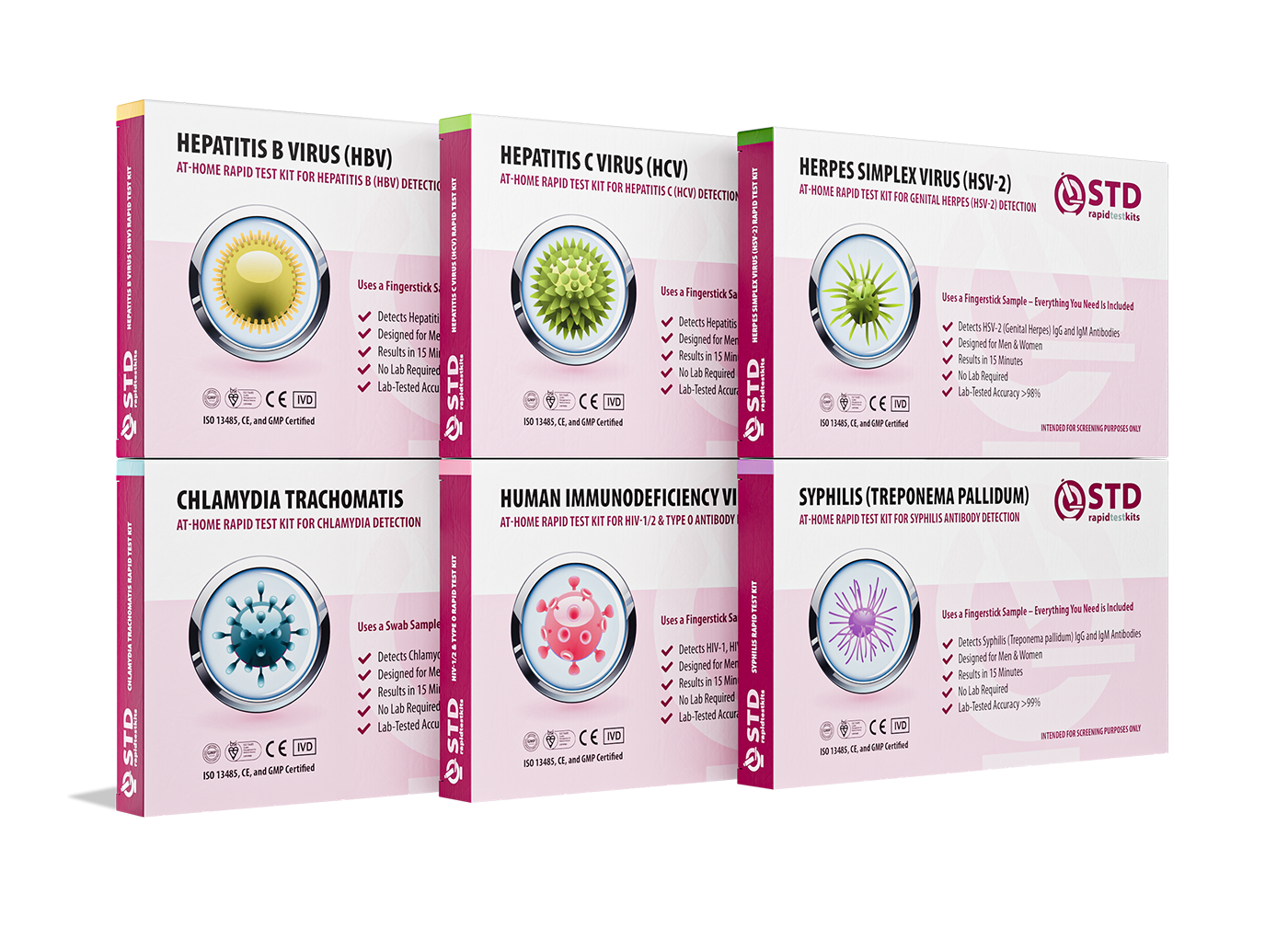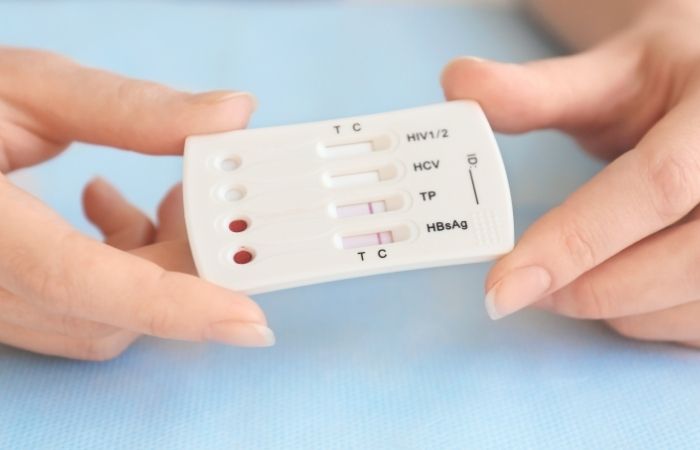Syphilis With No Symptoms: Can It Hide for Years?
Why You Should Care
Syphilis is no longer a relic of pre-antibiotic history, it’s a 2025 problem, and it’s moving fast. According to the CDC, syphilis rates in the U.S. have increased by over 74% since 2018, with congenital syphilis (passed from mother to baby) rising even faster. Globally, WHO reports that millions are infected each year, many without knowing it. And the scariest part? Most people don’t realize they’re contagious.
The modern face of syphilis is subtle. It often starts with a painless genital sore, so small it’s easy to miss or mistake for a razor bump. If untreated, it vanishes… but the infection doesn’t. It spreads through your bloodstream, eventually attacking your organs, eyes, brain, and nervous system. Syphilis can lie dormant for years before causing devastating damage.
Factors driving the comeback include:
- Dating app culture: Casual encounters with limited history sharing
- Condom fatigue: Declining condom use among younger people
- Gaps in testing: Many clinics were overwhelmed or closed during the pandemic
- Racial and economic disparities: Black, Indigenous, and LGBTQ+ communities are disproportionately affected
This isn’t a scare piece, it’s a wake-up call. And the good news? Syphilis is curable. You just have to catch it early.

People are also looking for: How do I bring up STD testing with a partner?
Key Benefits of Early Detection and At-Home Testing
The earlier you catch syphilis, the easier it is to treat. A single dose of penicillin can cure early-stage syphilis. But if you let it sit? You could face neurological issues, vision loss, and increased risk of HIV transmission.
That’s why at-home STD testing is a game-changer in 2025. Here's why it's working:
- Discreet and judgment-free: No awkward waiting rooms or invasive questions
- Quick turnaround: Most results arrive within 2–5 days
- Highly accurate: Tests detect antibodies with 95%+ reliability
- FDA-approved: Options like the syphilis test kit meet medical-grade standards
And for those nervous about privacy? These kits ship in plain packaging, and results are 100% confidential. It's not just convenient, it's empowering.
Challenges or Risks of Ignoring Syphilis
Let’s not sugarcoat it. Ignoring syphilis is dangerous, both personally and publicly. In its early stages, it doesn’t scream for attention. No burning. No discharge. Just a sore that might not even hurt. But that’s what makes it so deadly: people pass it along without knowing.
Untreated syphilis progresses through four stages:
- Primary: A single, painless sore (chancre)
- Secondary: Skin rashes, flu-like symptoms, swollen lymph nodes
- Latent: No symptoms, but infection lives in the body
- Tertiary: Severe organ damage, blindness, neurological issues
Even scarier: syphilis makes it easier to contract or transmit HIV. And in pregnancy, it can cross the placenta, causing stillbirth, premature delivery, or severe birth defects, part of why congenital syphilis has quadrupled in recent years.
Every missed diagnosis ripples outward. That’s why public health experts are sounding the alarm: testing isn’t just for you, it’s for your partners and your community.
Solutions and Recommendations
If you’re sexually active, especially with new or multiple partners, here’s the rule: get tested regularly, even if you feel fine. Syphilis loves to hide, and guessing based on symptoms isn’t reliable.
Here’s what to do now:
- Get tested at home: Use a trusted kit like the Complete STD Home Test Kit Package if you want to check for multiple infections
- Inform recent partners: If you test positive, they’ll need testing and treatment too
- Don’t self-diagnose: Syphilis can look like herpes, acne, even eczema, only a test can confirm
- Use protection: Condoms reduce (but don’t eliminate) syphilis risk, especially during oral sex
And if you’re positive? Take a deep breath. It’s not your fault, and you’re not dirty. You just need antibiotics, and support. The sooner you act, the less damage it can do. That’s control. That’s care. That’s you, taking your health seriously.
Check Your STD Status in Minutes
Test at Home with Remedium6-in-1 STD Test Kit

 For Men & Women
For Men & Women Results in Minutes
Results in Minutes No Lab Needed
No Lab Needed Private & Discreet
Private & DiscreetOrder Now $119.00 $294.00
For all 6 tests
Statistical Insights and Data
Numbers don’t lie, and in the case of syphilis, they’re sounding every alarm. According to the CDC’s 2024 STD Surveillance Report, syphilis rates in the United States have reached levels not seen since the 1950s. In just five years, reported primary and secondary syphilis cases jumped 74%, with over 207,000 new cases last year alone.
But the scariest spike? Congenital syphilis. In 2012, there were 334 cases in the U.S. In 2024, that number exploded to over 3,700, a more than 1000% increase. And globally, WHO estimates that over 1 million pregnant people each year are infected, many without being screened in time.
Other key findings include:
- Men who have sex with men (MSM): Account for over 40% of new syphilis cases
- Black and Indigenous communities: Disproportionately affected due to systemic healthcare inequities
- People under 35: Make up the fastest-growing group of infections, largely tied to dating app use and decreased condom use
The message is clear: syphilis isn’t a niche issue, it’s a widespread public health threat. And testing is the first line of defense.
Expert Opinions and Case Studies
Dr. Amy Rosenthal, an infectious disease specialist at NYU Langone, warns:
“What we’re seeing isn’t just a numbers game, it’s a failure of our sexual health infrastructure. People aren’t being screened, doctors aren’t recognizing symptoms, and stigma keeps people from speaking up.”
And it’s not just experts ringing the bell. Take “Marcus,” 29, from Chicago. He thought the small sore on his shaft was just an ingrown hair.
“It didn’t hurt, and it went away. Two months later, I was getting weird rashes on my hands and feet. I finally went to a clinic, they told me I had secondary syphilis.”
Then there’s “Elena,” 34, who found out she had syphilis during routine prenatal screening.
“I felt fine. No symptoms at all. If I hadn’t been pregnant, I never would’ve known. I hate to think what could’ve happened.”
These stories aren’t rare, they’re the rule. That’s why experts recommend frequent testing, especially for those in high-risk groups or with new sexual partners.
Practical Applications
Let’s get real: no one wants to deal with an STD. But ignoring syphilis won’t make it go away, it’ll just let it spread. The good news? You can act right now, from home, without telling a soul.
Here’s how:
- Feeling off? Use an at-home syphilis test, it’s accurate, fast, and discreet
- No symptoms? Still test every 3–6 months if you’re sexually active with new or multiple partners
- Tested positive? Call a clinic. Penicillin shots are highly effective, and treatment is simple when caught early
- Still unsure? Use combo tests like the Chlamydia, Gonorrhea, Syphilis Kit to rule out multiple infections at once
Testing is power. It’s not just about stopping an infection, it’s about reclaiming your right to feel safe in your body and relationships.

People are also looking for: Can you get Syphilis from kissing?
Personal Stories or Testimonials
It’s easy to feel like STDs happen to “other people.” But the truth? They happen to people just like you, smart, careful, educated, and human. These stories aren’t to scare you, they’re to show you that you’re not alone.
“Josh,” 26, was in a monogamous relationship when he got tested for syphilis during a routine screening.
“I only did it because my partner asked. I had zero symptoms. But I tested positive. We talked, we treated it, and we stayed together. Testing probably saved our relationship.”
“Lana,” 38, thought the strange rash on her palms was an allergic reaction.
“It never occurred to me that it could be an STD. I’m married. But I had an affair a year ago. My doctor said it was secondary syphilis. I was shocked, but I’m glad I found out. It was my wake-up call.”
“Devon,” 19, was terrified after his hookup said they tested positive.
“I panicked. But I got an at-home test, and it was fast and private. When I tested negative, I cried with relief. I still test regularly. It’s become part of how I take care of myself.”
No shame. No judgment. Just real people, facing real things, and getting through it with knowledge and support.
Common Misconceptions
Syphilis is surrounded by myths, and those myths cost people time, health, and peace of mind. Let’s clear a few up.
- “Syphilis only happens to promiscuous people.” Nope. One encounter is enough. It has nothing to do with how many people you sleep with.
- “I would know if I had it.” Not true. Most people don’t have obvious symptoms. Some don’t notice anything at all.
- “Syphilis went away decades ago.” It declined, but it’s back and spreading fast, especially among people under 40.
- “You can’t catch it from oral sex.” You can. Syphilis sores can live in the mouth and throat.
- “If the sore is gone, I’m fine.” Wrong. That’s just stage one. The infection is still in your system.
What keeps syphilis spreading isn’t just biology, it’s bad info. Getting tested is one way to break that cycle.
Check Your STD Status in Minutes
Test at Home with Remedium6-in-1 STD Rapid Test Kit

 For Men & Women
For Men & Women Results in Minutes
Results in Minutes No Lab Needed
No Lab Needed Private & Discreet
Private & DiscreetOrder Now $119.00 $294.00
For all 6 tests
FAQs
1. Can I get syphilis from oral sex?
Yes. Syphilis can be transmitted through oral-genital contact if a sore (chancre) is present in the mouth, genitals, or anus, even if it's invisible.
2. What does a syphilis sore look like?
It’s usually a small, painless, firm ulcer that can appear on genitals, anus, lips, or mouth. Many people mistake it for a pimple or cut.
3. How long after exposure does syphilis show up?
The first sore typically appears 10–90 days after exposure, most commonly around 3 weeks.
4. Is syphilis curable?
Yes. Syphilis is completely curable with antibiotics, usually penicillin. The earlier you treat it, the better.
5. Can you get syphilis more than once?
Absolutely. Being treated doesn’t make you immune. You can get reinfected from a new partner, or even the same one if they weren’t treated.
6. Is syphilis dangerous during pregnancy?
Yes. It can be passed to the baby, causing miscarriage, stillbirth, or birth defects. Pregnant people should be screened early and again later in pregnancy.
7. What happens if syphilis is untreated?
It can lead to serious complications including blindness, stroke, organ damage, and neurosyphilis. It can also make HIV transmission more likely.
8. Can I test for syphilis at home?
Yes. At-home test kits can detect syphilis antibodies in your blood with high accuracy. Results are usually ready in a few days.
9. How accurate are home test kits?
Most FDA-approved syphilis test kits are over 95% accurate when used correctly and during the appropriate window period.
10. What’s the best test if I don’t know what I was exposed to?
Use a combo test like the Complete STD Home Test Kit Package to screen for multiple STDs at once.
You’re Not Alone, and You’re Not Powerless
Syphilis is back, but fear doesn’t have to be. What matters most isn’t how or why you might’ve been exposed. It’s what you choose to do next. Testing isn’t about guilt or blame, it’s about owning your health, protecting your partners, and refusing to let shame keep you in the dark.
There’s a reason health experts are ringing the alarm: syphilis is spreading silently, often without symptoms. But the tools to fight it are more accessible than ever. At-home testing puts answers in your hands, literally. No judgment. No waiting rooms. Just the truth, fast.
If you're scared, that’s okay. If you're not sure what that sore is, you’re not alone. If you've never been tested and feel overwhelmed, that’s valid. But knowledge is power, and action is healing. Get tested. Start the conversation. You deserve to know what’s going on with your body, and you deserve to feel safe in it.
Sources
1. CDC – 2022 STD Surveillance Report
3. Mayo Clinic – Syphilis Overview










